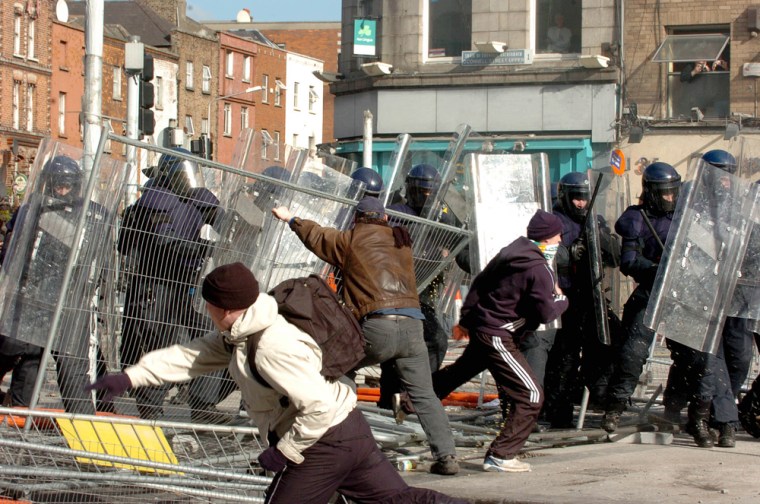Several hundred Irish Republican Army supporters attacked police in Dublin on Saturday to protest an unprecedented parade through the capital by Protestants from Northern Ireland.
In scenes rare for the Republic of Ireland, protesters hurled bottles, bricks, concrete blocks and fireworks at police officers trying to clear the hostile crowd from Dublin’s most famous boulevard, O’Connell Street.
Even though the Protestants abandoned their parade, the battles spread to streets near the national parliament and museums, as well as a shopping center and the major tourist district, Temple Bar.
Ireland’s national police force said 14 people — six officers and eight civilians, including rioters and a journalist — were hospitalized, mostly with head wounds. More than a dozen other people suffered less serious injuries.
The police advised shoppers and tourists to avoid the entire city center, which is normally packed with pedestrians on Saturdays.
At least 37 arrested
Officers in full riot gear — helmets, shields, clubs and flame-retardant suits — arrested at least 37 protesters as a police surveillance plane circled overhead.
The protesters, mostly young men covering their faces with scarves, chanted pro-IRA slogans as they waged running battles with riot police and other officers on horseback for more than an hour, forcing shops on Ireland’s most famous street to close.
Near Leinster House, Ireland’s parliament building, at least three cars were flipped over and set on fire, while windows on scores of cars and businesses were smashed.
The rioters’ mayhem forced Protestant hard-liners to abandon their plan to parade through Dublin. It would have been the first parade in Dublin by pro-British Protestants since Ireland’s partition into a mostly Protestant north and mostly Roman Catholic south in 1921.
However, the would-be marchers, who came accompanied by traditional bands of fife and drum, instead traveled by bus to the besieged parliamentary building.
Ahern condemns rioters
Irish Prime Minister Bertie Ahern said Protestant “unionists,” who favor Northern Ireland’s union with Britain, should have enjoyed freedom to demonstrate their views, and he condemned the rioters as anti-democratic.
“There is absolutely no excuse for the disgraceful scenes in Dublin today,” Ahern said. “It is the essence of Irish democracy and republicanism that people are allowed to express their views freely and in a peaceful manner. People who want only attack gardai (police) and property have no respect for their fellow citizens.”
The central boulevard, O’Connell Street, was littered with broken paving stones, knocked-down crowd control barriers, toppled traffic cones and glass from shattered shop windows.
Leaders of the aborted parade praised police efforts to protect them, but nonetheless handed a letter of protest to Justice Minister Michael McDowell during a meeting inside Leinster House as the trouble continued.
A Protestant politician said the rioters had mostly traveled to Dublin from Catholic areas of Northern Ireland.
‘Warm welcome from ordinary Dubliners’
“We have received a warm welcome from ordinary Dubliners,” Democratic Unionist Party lawmaker Jeffrey Donaldson said. “But it’s clear these republicans have come from north of the border and other areas intent only on causing trouble.”
McDowell blamed the violence on “an organized mob who came to Dublin with the intention of deliberately creating mayhem in a peaceful and prosperous city.”
“The only message these people have managed to convey to the people of Dublin and of Ireland is that sectarian violence is, once again, being unleashed against all of the principles of the Good Friday agreement and the overwhelming wishes of the Irish people,” McDowell said, referring to the 1998 peace accord for Northern Ireland.
Sinn Fein leader Gerry Adams, whose IRA-linked party represents most Catholics in Northern Ireland but is less popular in the Irish Republic, said he had called on supporters to ignore the Protestants’ parade plan “and not to be provoked by it. “
“Regrettably a small, unrepresentative group chose to ignore our appeal. Their actions were entirely wrong and reprehensible,” Adams said.
The march was part of a campaign led by Willie Frazer, several of whose relatives were killed by the modern IRA, which in 1970 launched a bloody campaign to force Northern Ireland out of the United Kingdom.
His other pressure group, Families Acting for Innocent Relatives, seeks to highlight Protestant grievances against the IRA, which killed about 1,775 people and maimed thousands more before calling a 1997 cease-fire.
